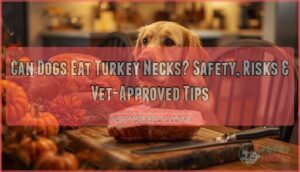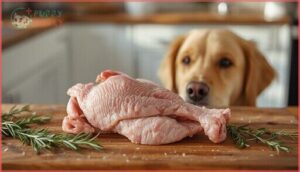This site is supported by our readers. We may earn a commission, at no cost to you, if you purchase through links.
Your dog’s pleading eyes follow every movement as you carve the Thanksgiving turkey, and that leftover neck sitting on the counter suddenly seems like the perfect treat. Before you toss it their way, though, there’s more to think about than just your pup’s enthusiasm.
Turkey necks can be a nutritious addition to your dog’s diet, offering protein, calcium, and natural teeth-cleaning action—but they also come with serious risks that every pet owner should understand. The difference between a beneficial treat and a veterinary emergency often comes down to preparation, sizing, and knowing whether your furry friend is even a good candidate for this chewy snack.
Table Of Contents
- Key Takeaways
- Can Dogs Eat Turkey Necks?
- What Are Turkey Necks for Dogs?
- Nutritional Benefits of Turkey Necks
- Are Raw or Cooked Turkey Necks Safer?
- Potential Risks of Feeding Turkey Necks
- Which Dogs Should Not Eat Turkey Necks?
- Safe Preparation and Serving Tips
- Supervision and Monitoring Guidelines
- Alternatives to Turkey Necks for Dogs
- When to Consult a Veterinarian
- Frequently Asked Questions (FAQs)
- Can I give the turkey neck to my dog?
- Is it safe for a dog to have a turkey neck?
- Are turkey necks safe for dogs?
- Can dogs eat turkey neck bones?
- What happens if a dog eats a turkey neck?
- Can a dog eat raw turkey necks?
- Can dogs eat turkey necks on Thanksgiving?
- Can dogs eat frozen turkey necks?
- Can dogs eat cooked turkey neck?
- What part of turkey can dogs not eat?
- Conclusion
Key Takeaways
- Turkey necks offer real nutritional benefits—protein, calcium, glucosamine for joints, and natural teeth-cleaning action—but they’re not safe for every dog, especially small breeds, brachycephalic dogs like bulldogs, and gulpers who don’t chew properly.
- Raw turkey necks preserve nutrients and softer bones but carry bacterial contamination risks like Salmonella, while cooked necks eliminate bacteria but create brittle, splintering bones that can cause life-threatening internal injuries.
- Safe feeding requires active supervision, proper sizing for your dog’s breed, limiting sessions to 10-45 minutes depending on experience, and removing the neck once meat is gone or splintering begins to prevent choking and blockages.
- Consult your veterinarian before introducing turkey necks, watch for warning signs like gagging, bloody stool, vomiting, or abdominal pain, and consider safer alternatives like chicken necks, VOHC-approved dental chews, or single-ingredient natural treats if turkey necks don’t fit your dog’s needs.
Can Dogs Eat Turkey Necks?
Yes, many healthy adult dogs can safely eat turkey necks when they’re appropriately sized and introduced slowly to their diet. These meaty treats have become popular in raw feeding benefits discussions and homemade dog nutrition facts, offering both mental stimulation and potential dental perks for your furry friends. However, the answer isn’t a simple yes for every pup.
Many dog owners have found success feeding raw turkey necks to their pets, particularly when they start with smaller portions and monitor their dog’s response.
Can dogs eat turkey necks without worry? Not always. Very small dogs, brachycephalic breeds like bulldogs, and dogs who gulp their food face higher turkey neck risks, including choking and blockages. Raw turkey necks carry bacterial concerns, while cooked versions may splinter dangerously. That’s why pet food safety experts emphasize supervision, proper sizing, and veterinary advice before adding them to your dog’s routine.
Turkey necks aren’t safe for all dogs—small breeds, bulldogs, and gulpers risk choking, while raw necks harbor bacteria and cooked ones splinter dangerously
When approached thoughtfully, turkey necks can be a nutritious option, but they’re not without serious considerations. According to experts, the nutritional benefits of turkey necks include providing protein, calcium, and joint-supporting nutrients for dogs.
What Are Turkey Necks for Dogs?
Before you toss your dog a turkey neck, it helps to know exactly what you’re feeding. Turkey necks are more than just leftover scraps—they’re a specific part of the bird with unique characteristics that affect how safe and beneficial they’re for your furry friend.
Let’s break down what turkey necks actually are and where you can find them.
Definition and Anatomy
A turkey neck is the elongated section running from your furry friend’s treat bowl straight from the bird’s head to its upper chest, packed with 13 cervical vertebrae that form a flexible bony chain.
This anatomy overview reveals a bone structure rich in cartilage, neck muscles wrapped in tendons, and joint health compounds—making turkey necks a unique option in canine nutrition and raw feeding conversations.
Typical Sources and Forms
Now that you understand the anatomy, let’s explore where to find these chews.
Raw butcher counters and meat sections often carry whole raw turkey necks, while pet retailers stock frozen necks in resealable bags for easier portion control. You’ll also discover dehydrated chews that are shelf-stable, freeze-dried turkey necks that rehydrate overnight, and commercial blends that grind cooked turkey necks into balanced meal toppers.
For an additive-free option made from 100% pasture-raised turkey, consider skinless dehydrated turkey necks as a nutrient-dense chew.
Nutritional Benefits of Turkey Necks
Turkey necks aren’t just a treat your dog will love—they actually pack a surprising nutritional punch. When fed properly, they offer benefits that go beyond simple satisfaction, supporting everything from your pup’s joints to their pearly whites.
Let’s break down the key nutritional advantages that make turkey necks worth considering for your furry friend.
Protein and Nutrient Content
Your furry friend gets a protein powerhouse when you offer turkey necks. Raw turkey neck meat delivers 17 to 22 grams of complete protein per 100 grams, meeting canine dietary needs with all essential amino acids for muscle repair.
This amino acid profile assists everything from muscle maintenance to healthy skin and coat.
- Nutrient density shines through with B vitamins like niacin (4.9mg) and B12 (1.8mcg) supporting energy metabolism
- Mineral content includes phosphorus (160mg) and zinc (3.4mg) for bone strength and immune function
- Protein sources from turkey provide enhanced digestibility compared to plant-based options
Glucosamine and Joint Health
One of nature’s best-kept secrets hides in those chewy turkey necks—natural glucosamine and chondroitin for cartilage health. Your dog’s joints benefit from the building blocks that aid shock-absorbing cartilage, easing stiffness and improving canine mobility over time.
Many joint supplements replicate what turkey necks offer naturally as natural remedies.
| Joint Support Component | Benefit for Your Dog |
|---|---|
| Glucosamine | Rebuilds worn cartilage, reduces dog arthritis discomfort |
| Chondroitin | Lubricates joints, aids daily movement |
| Natural cartilage | Provides raw materials for joint tissue repair |
| Long-term use | Enhances comfort during walking and running |
Dental Health Support
Imagine your dog wielding a natural toothbrush—that’s basically what happens when they gnaw on turkey necks. The mechanical action scrubs plaque away before it hardens into tartar, supporting canine dental health and hygiene far better than soft foods alone.
Just make sure any chew treats complement a balanced diet free of risky foods that could upset their stomach or digestion.
Raw feeding advocates particularly value turkey necks for maintaining oral hygiene between professional cleanings.
Benefits for canine dental health include:
- Plaque removal through natural abrasive chewing action
- Gum disease prevention via improved blood flow to gum tissue
- Jaw health exercise from sustained chewing sessions
- Tooth decay reduction by removing food debris
- Natural alternative to commercial dental chews
Are Raw or Cooked Turkey Necks Safer?
The debate between raw and cooked turkey necks isn’t black and white, and both options come with their own set of advantages and safety concerns. Your choice ultimately depends on your dog’s health status, your comfort level with raw feeding, and how you manage preparation risks.
Let’s break down what you need to know about each approach so you can make the safest decision for your furry friend.
Pros and Cons of Raw Turkey Necks
Raw feeding with turkey necks delivers real turkey neck benefits, including natural nutrient balance, substantial protein, and canine dental health support through extended chewing.
However, raw turkey necks also carry dog health risks like bacterial contamination, choking risks for smaller breeds, and digestive issues if your pup swallows large chunks.
Weighing these pros and cons carefully helps you decide if raw feeding fits your dog’s needs.
Risks and Benefits of Cooked Turkey Necks
Cooking turkey necks eliminates bacterial threats, but the heat transforms bones into brittle hazards that splinter easily and threaten your dog’s digestive tract.
Most veterinarians recommend skipping cooked turkey necks entirely.
- Cooked Bone Risks: Brittle bones break into sharp fragments that can puncture your dog’s stomach or intestines
- Nutrient Retention: Protein and minerals remain, yet safer boneless options deliver identical nutritional value
- Digestive Issues: Bone shards trigger blockages, vomiting, and potential peritonitis
- Safe Handling: Proper food safety and handling practices reduce bacteria but don’t eliminate splintering danger
Potential Risks of Feeding Turkey Necks
While turkey necks can offer nutritional benefits for your dog, they’re not without their downsides. Understanding the potential risks helps you make informed decisions and take proper precautions.
Let’s look at the main concerns you should be aware of before adding turkey necks to your dog’s diet.
Choking Hazards
Turkey necks present real choking hazards, especially for smaller breeds or dogs that gulp their food. The long, cylindrical shape can lodge in your dog’s throat if swallowed whole, causing airway obstruction. Brachycephalic breeds like pugs face even greater risk due to their canine anatomy.
Choking prevention starts with supervision—watch for pawing at the mouth, excessive drooling, or distress requiring emergency response.
Bone Splintering and Internal Injury
While choking hazards grab headlines, bone splintering poses an equally serious threat to your furry friend’s internal organs. Cooked turkey neck bones turn brittle and break into jagged shards that can cause gastrointestinal damage from mouth to colon.
- Sharp bone fragments lacerate mouth tissue, esophagus, and stomach lining, causing internal bleeding
- Splinter injuries can puncture the intestinal wall, leading to life-threatening peritonitis
- Large bone pieces lodge in the digestive tract, creating painful blockages requiring emergency surgery
- Bone fragmentation increases when dogs gulp food quickly without proper chewing
- Sharp edge risks remain present even with careful supervision during feeding sessions
Bacterial Contamination
Beyond the physical dangers of splintering, bacterial contamination introduces Food Safety Risks that affect your entire household. Raw Turkey Necks can harbor Salmonella, E. coli, Listeria, and Campylobacter—pathogens that trigger vomiting, diarrhea, and fever in dogs while threatening family members through Raw Meat Hazards.
Kitchen Sanitation becomes critical, as bacteria spread from raw juices to counters and hands, creating Bacterial Transmission risks that careful Contamination Control and thorough cooking can markedly reduce.
Allergic Reactions
While bacteria and bones pose clear threats, Food Allergies present a quieter danger. Around 10 to 15 percent of food-allergic dogs react to poultry proteins, triggering Allergic Symptoms like paw chewing, ear infections, and digestive upset.
Dogs with Poultry Sensitivity face Anaphylaxis Risk—facial swelling, hives, or collapse—requiring emergency care. Reaction Prevention starts with recognizing turkey-neck risks in allergy-prone pets.
Which Dogs Should Not Eat Turkey Necks?
While turkey necks can be a nutritious treat for many dogs, they’re not a one-size-fits-all solution. Certain dogs face higher risks due to their size, age, or existing health conditions, making turkey necks an unsafe choice.
Let’s look at which dogs should steer clear of this particular chew to keep them safe and healthy.
Size and Breed Considerations
Your pup’s size and build matter more than you might think regarding turkey necks. Whole necks suit medium to large dogs, but small breeds under 20–25 pounds face higher choking risks because bone pieces can exceed their airway width.
Jaw strength variations, head anatomy differences, and breed-specific feeding guidelines all influence safe portion sizes, so tailor body size factors to your dog’s unique needs.
Age and Health Restrictions
Age plays a bigger role than most owners realize—puppies under 12 weeks have immature immune systems that struggle with bacteria on raw necks, while seniors with dental disease, pancreatitis history, or slower digestion face higher risks of broken teeth, flare-ups, and blockages.
Dogs on immune-suppressing medications, weight-loss programs, or managing digestive issues should skip turkey necks entirely and follow veterinary advice for safer alternatives.
Dogs With Food Allergies
If your dog has a confirmed poultry allergy, turkey necks are a hard no—even a novel protein like turkey can trigger itchy skin, ear infections, and digestive upset in sensitive pups. Before offering turkey necks:
- Review any prior allergy testing or food trials your vet has recommended
- Watch for canine dermatitis flare-ups after introducing new proteins
- Consider hypoallergenic diets or limited ingredient diet plans first
- Verify nutrient balance isn’t compromised by avoiding entire protein families
Safe Preparation and Serving Tips
If you’ve decided turkey necks are right for your dog, proper preparation is half the battle. Whether you’re going the raw route or cooking them through, a few key steps can make all the difference in keeping your pup safe.
Let’s walk through how to handle, prepare, and serve turkey necks the right way.
How to Prepare Raw Turkey Necks
If you’re considering Raw Diet Benefits, proper Raw Handling Tips make all the difference. Start with Frozen Storage at 0°F or below, then use safe Thawing Methods—refrigerate for 5 to 6 hours rather than leaving Turkey Necks at room temperature.
Practice strict Hygiene Practices: wash hands before and after Safe Trimming of excess fat. Always sanitize surfaces used for Raw Meat to protect your furry friend and family from contamination.
How to Cook Turkey Necks Safely
Cooking Methods matter for Safe Dog Treats: slow cookers or pressure cookers soften turkey necks more thoroughly than roasting. Aim for an internal temperature of 165°F to guarantee Food Safety and protect Dog Health.
After Meal Preparation, careful Bone Removal is essential—sift through Cooked Turkey Necks by hand to discard any hard fragments that could injure your pup. Never add seasoning.
Portion Sizes and Frequency
Portion Guidelines are all about balance—a turkey neck isn’t a free bonus on top of regular meals. For a 50-pound dog, one medium neck often works as a complete Meal Replacement two to three times per week within your Dog Diet.
Daily Feeding can lead to constipation, so Feeding Schedules matter. Calorie Control means adjusting kibble the same day to protect Dog Health and Pet Nutrition goals.
Supervision and Monitoring Guidelines
Even with proper preparation, feeding your dog a turkey neck isn’t a set-it-and-forget-it situation. Active supervision is your best tool for preventing accidents and catching problems before they escalate.
Here’s what you need to watch for and when it’s time to step in.
Signs of Trouble During Chewing
When your furry friend suddenly paws at their mouth, struggles to breathe, or shows pale gums during chewing, you’re witnessing potential choking signs that demand immediate action. Watch for behavioral changes like frantic pacing, excessive drooling, or repeated gagging—these emergency response signals indicate choking hazards or mouth injury from bones.
Fresh blood, wheezing, or visible digestive issues mean turkey necks pose serious pet safety risks requiring urgent attention.
When to Remove The Turkey Neck
Most beginners need chew time limits of 10 to 15 minutes for safe removal and choking prevention, while experienced chewers may handle turkey necks for up to 45 minutes. Assess bone condition throughout the session—once meat disappears or splintering begins, it’s time to act.
Dog monitoring prevents bacterial contamination and choking hazard risks, supporting long-term dog health and nutrition during canine consumption.
Alternatives to Turkey Necks for Dogs
If turkey necks don’t feel like the right fit for your dog, or if you’re simply looking for variety, there are plenty of safe and nutritious alternatives worth considering.
From other poultry options to specially designed dental chews, you have choices that can meet your dog’s chewing needs without the same risk profile.
Let’s look at some vet-approved alternatives that offer similar benefits with different trade-offs.
Chicken Necks and Other Poultry
If turkey necks don’t suit your furry friend, other poultry options offer similar canine diet and nutrition benefits. Chicken necks provide around 55 percent muscle meat and 45 percent bone, delivering protein, calcium, and joint-supporting cartilage. Duck necks pack higher iron and selenium for dogs tolerating richer fowl.
Consider these poultry nutrition alternatives:
- Raw chicken necks for smaller dogs needing meaty bones
- Duck necks offering selenium and B vitamins
- Chicken feet providing natural glucosamine
- Duck feet for cartilage-rich joint support
- Turkey wings as larger chew options
Always source from suppliers following strict meat safety standards to minimize avian health risks.
Dental Chews and Natural Treats
When turkey necks feel too risky, dental chews and natural treats support oral hygiene without the hazards. Products with the VOHC seal reduce plaque by at least 20 percent, while single-ingredient options like freeze-dried liver deliver protein without artificial additives.
Choose treats with limited, recognizable ingredients to support pet nutrition and chew safety, keeping your dog’s healthy dog treats routine both effective and worry-free.
Commercially Available Safe Chews
Many safe chew options use food-grade natural rubber or nylon that won’t introduce toxins, while brands like yak cheese sticks and elk antlers balance chew durability with dog toy safety.
Look for products that list calorie counts and country of origin—hallmarks of responsible pet chew trends. Reputable companies hand-inspect pieces and provide clear feeding guidelines, so you can support dog nutrition and health without the guesswork.
When to Consult a Veterinarian
Even with careful preparation and supervision, things don’t always go as planned when feeding turkey necks to your dog. Knowing when to reach out to your veterinarian can make all the difference in preventing minor issues from becoming serious health problems.
Here’s what to watch for and when professional guidance is essential.
Signs of Adverse Reactions
Your dog’s body will signal trouble loud and clear. Watch for digestive issues like vomiting or diarrhea, allergic reactions such as itching or swollen skin, and choking hazards indicated by gagging or pawing at the mouth.
Internal injuries may show as bloody stool or abdominal pain, while systemic shock appears through lethargy, pale gums, or fever—all demanding immediate veterinary care.
Personalized Dietary Advice
Every furry friend deserves a feeding plan that honors their unique needs, and that’s where vet consultation for dog owners becomes invaluable. Your veterinarian can provide tailored nutrition through dietary assessment, ensuring nutrient balance fits your dog’s age, weight, and health status.
This pet owner guidance transforms canine diet and wellness from guesswork into science, offering dog nutrition advice and pet nutrition tips that protect your companion’s long-term health.
Frequently Asked Questions (FAQs)
Can I give the turkey neck to my dog?
Before bringing bones to your furry friend, balance benefits against potential perils. Yes, you can give turkey necks to your dog, but only with careful consideration of size, preparation method, and individual health factors requiring veterinary advice first.
Is it safe for a dog to have a turkey neck?
Safety depends on your furry friend’s size, chewing habits, and how you prepare the turkey neck. Raw versions carry bacterial risks, while cooked bones can splinter—supervision and proper handling are essential for canine consumption.
Are turkey necks safe for dogs?
You’ve probably heard conflicting advice about turkey necks for furry friends. The truth is, they’re not universally safe—your dog’s size, chewing style, and the neck’s preparation determine whether this treat helps or harms.
Can dogs eat turkey neck bones?
Dogs can eat turkey neck bones when they’re raw and appropriately sized, but cooked bones splinter easily and create serious choking or internal injury risks, making supervision and careful bone selection absolutely critical for canine health.
What happens if a dog eats a turkey neck?
Most dogs will digest the soft meat and cartilage from a turkey neck within hours, but bone fragments can linger in the stomach, sometimes triggering vomiting, digestive reactions, or dangerous internal injuries from bone fragmentation.
Can a dog eat raw turkey necks?
Yes, many healthy adult dogs can eat raw turkey necks as an occasional chew under supervision, but raw meat carries bacterial risks like Salmonella, requiring careful handling and veterinary advice.
Can dogs eat turkey necks on Thanksgiving?
Your furry friend can enjoy turkey necks on Thanksgiving if you prepare them safely, choose an appropriate size, and supervise closely—just keep them plain, without butter, seasonings, or holiday drippings.
Can dogs eat frozen turkey necks?
Your pup can enjoy frozen turkey necks when they’re raw, appropriately sized, and closely supervised.
Freezing slows chewing and reduces gulping, making them safer than room-temperature options for most dogs.
Can dogs eat cooked turkey neck?
While technically edible, cooked turkey necks pose a paradox—cooking eliminates bacteria but creates brittle bones that splinter dangerously.
Your furry friend faces choking, internal injury, and blockage risks from these seemingly safer treats.
What part of turkey can dogs not eat?
Dogs can’t safely eat turkey bones, fatty skin, seasoned meat, or raw internal organs. Bones pose choking hazards and splinter risks, while seasonings may contain toxic ingredients like garlic or onions that damage red blood cells.
Conclusion
Turkey necks can be both wonderfully beneficial and potentially dangerous—the key lies in knowing your dog and making informed choices. Whether you decide can dogs eat the turkey neck safely depends on your pet’s size, chewing habits, and health status.
Always supervise closely, choose raw over cooked when possible, and don’t hesitate to reach out to your veterinarian with concerns. Your dog’s safety isn’t about avoiding all risks—it’s about managing them wisely.
- https://www.undertheweatherpet.com/blogs/under-the-weather/turkey-necks-treat-assessing-the-safety-for-canine-consumption
- https://www.totalveterinarycare.com/blog/pancreatitis-in-pets-lets-talk-turkey-and-other-hazards/
- https://www.petmd.com/dog/nutrition/can-dogs-eat-turkey
- https://omaspride.com/blogs/articles/all-about-raw-bones-for-dogs
- https://topdogfoodandsupply.com/products/turkey-necks-ground


















